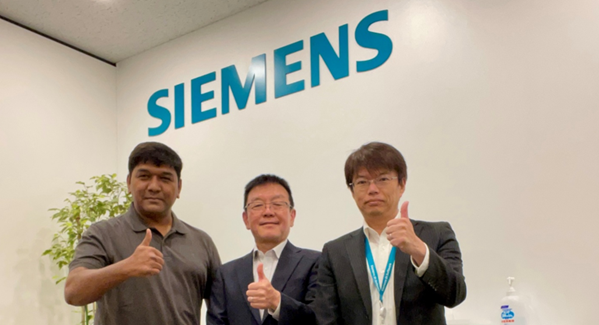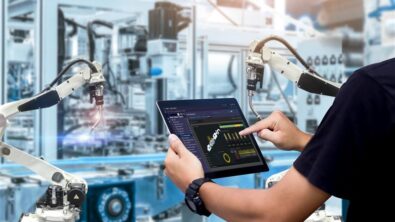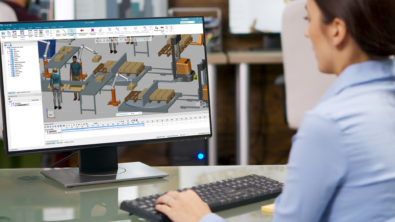The latest in automotive manufacturing in Japan

Over the past several decades, digital manufacturing technologies have revolutionized automotive production, enhancing both efficiency and quality. Breakthroughs such as the Internet of Things (IoT), artificial intelligence (AI), machine learning (ML), and big data analytics have empowered manufacturers to develop increasingly intelligent vehicles, including self-driving cars.
With these incredible advances, automotive manufacturers still face a myriad of challenges. These include the need for increased operational efficiency, and the drive to innovate rapidly, all while adopting sustainable practices.
In the driver’s seat of innovation at Siemens
As a Senior Technical Product Manager with Siemens Digital Industries Software, I [Sahir Patel] am responsible for the strategy and product roadmap of our manufacturing engineering cloud-based solutions. A part of my role involves gathering, researching, and defining product and business requirements to help scope and deploy new features and innovations based on specific market segments to expand and enhance our solution offerings.
I recently had an automotive customer visit to Japan with my Siemens colleagues pictured below, where I had the opportunity to witness firsthand the dynamic landscape of the industry during my meetings with three automotive OEMs and one auto supplier at their manufacturing plants. Engaging in insightful discussions and collaborations with key stakeholders, I gained valuable insights into the emerging trends shaping the future of manufacturing.

Manufacturing is undergoing a digital revolution, driven by technologies like AI, IoT, and cloud computing, enabling smart factories and connected ecosystems. The integration of advanced technologies is leading to higher productivity, lower costs, and improved quality through real-time monitoring and autonomous decision-making. Increasingly, manufacturers are also adopting sustainable practices to reduce environmental impact, meet regulatory requirements, and address consumer demands most efficiently.
Japanese automotive manufacturers embrace cloud-based Process Simulate Collaborate
Digital manufacturing is playing a pivotal role in transforming automotive manufacturing processes. Specifically, Siemens Tecnomatix Process Simulate has remained at the forefront of this transformation. Automotive manufacturers use Tecnomatix Process Simulate to enhance various aspects of their production processes such as simulating and validating robotic operations offline, eliminating the need for physical prototypes and reducing production downtime. By virtually commissioning entire production lines, manufacturers can test and validate system behavior before physical implementation, significantly reducing integration and start-up downtime.
Long-time users of Process Simulate now realize the enhanced value offered by Siemens newest cloud-based solution, Process Simulate Collaborate, an application for visualizing and analyzing factory production lines with ease. Process Simulate Collaborate helps customers eliminate the traditional ways of sharing robotic simulation studies so now they can use the cloud-based solution to gain a new level of efficiency and productivity. From design optimization and simplified workflows to streamlining collaboration among team members, stakeholders, and suppliers.
For example, I met with an auto supplier in Japan that completed a trial of Tecnomatix Process Simulate Collaborate to validate various use cases, including leveraging point cloud data as shown below captured through scanning the shop floor for visual inspection and layout planning. Point cloud is a safety review feature that helps engineers in improving workflows with regards to safety planning and validation for automation and robotics stations. Shortly after the auto supplier’s trial concluded, the auto supplier went live with the production.
The future of automotive manufacturing is incredibly promising with the ongoing integration of cutting-edge technologies. Innovations such as digital twins, IIoT, machine learning, and AR/VR are revolutionizing the way cars are built. By embracing these advanced solutions, automotive manufacturers are not only boosting operational efficiency and reducing costs but also significantly enhancing customer experiences.
Customer meetings like this help our team understand their unique needs and pain points, enabling us to tailor our solutions more effectively and ensuring alignment so we can drive continuous improvement and innovation in our products and services. With Siemens as a trusted partner, automotive manufacturers can confidently embrace digital transformation, unlock new opportunities for innovation, and achieve sustainable success in an increasingly digital world.
![Reshaping the world with digital manufacturing [VIDEO]](https://blogs.sw.siemens.com/wp-content/uploads/sites/7/2024/07/Zvi_2024_2-395x222.png)

